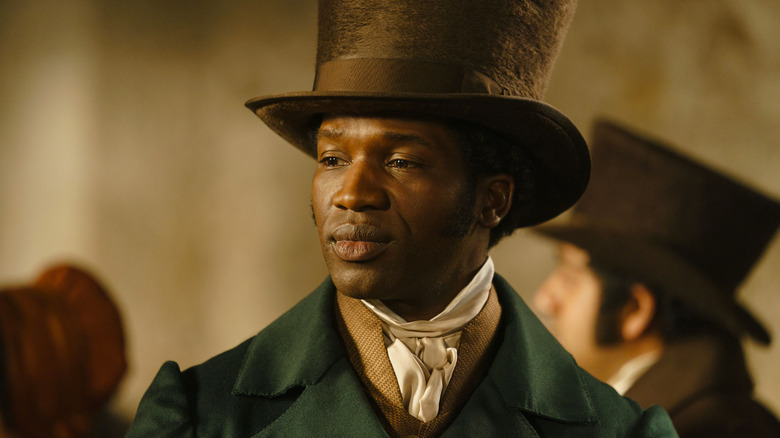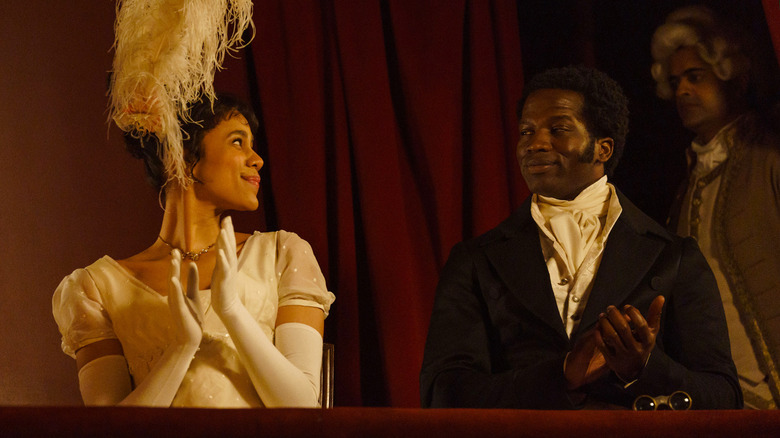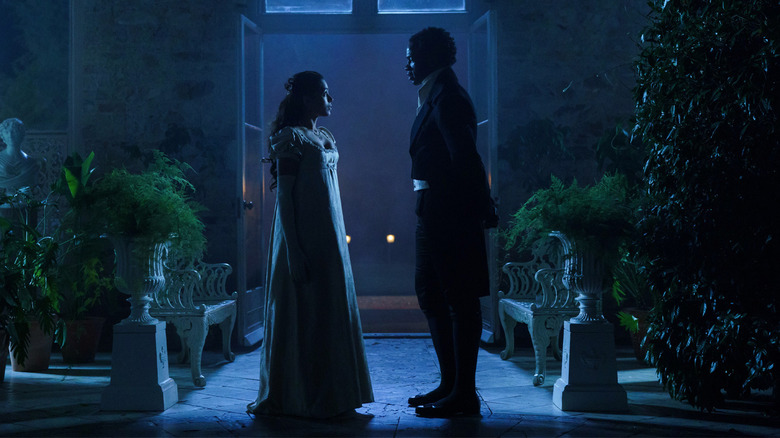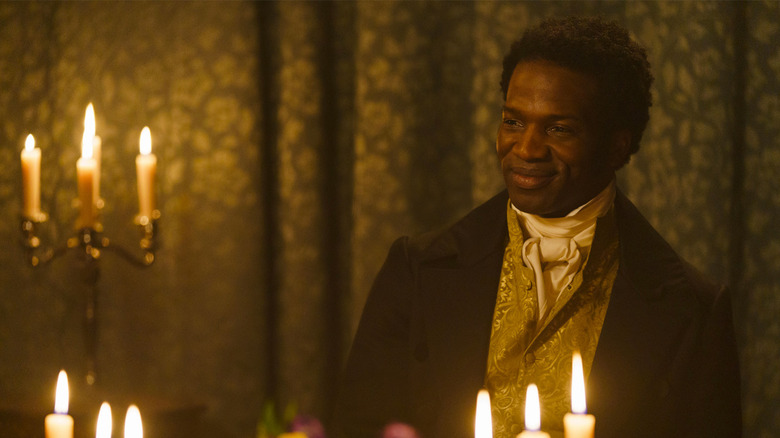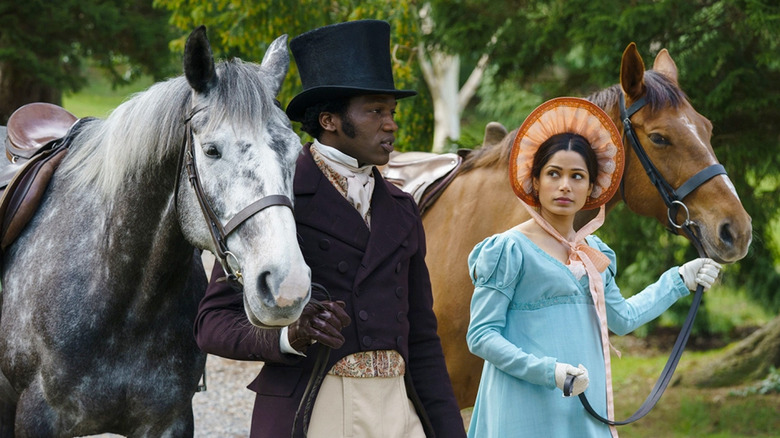How Mr. Malcolm's List Star Ṣọpẹ́ Dìrísù Stepped Into The Shoes Of The Romantic Lead [Interview]
Ṣọpẹ́ Dìrísù is no stranger to intensity. He's perhaps best known for star-making turns in the 2020 horror "His House" and the infamously-brutal crime drama "Gangs of London." On stage, Dìrísù has portrayed heavyweight champ Cassius Clay in "One Night in Miami," and his 2018 portrayal of Coriolanus with Royal Shakespeare Company saw the actor covered in blood from head to toe, "Carrie"-style. He's racked up a formidable list of credits in a short amount of time, each more compelling than the last. But until "Mr. Malcolm's List," the actor had yet to play a romantic lead, least of all in an Austenian period drama.
That didn't stop Emma Holly Jones from making Dìrísù her leading man in the Regency rom-com. The "Mr. Malcolm's List" director has been outspoken about Dìrísù's untapped potential as a leading man, advocating for the actor in spaces that he might not have imagined himself occupying before. It's taken quite a few years for color-conscious casting to really gel in the public zeitgeist, and in many ways, Hollywood still has a long way to go. But if Dìrísù's turn as the titular English gentleman in "Mr. Malcolm's List" has proven anything, it's that the image of the perfect leading man just got a little more inclusive.
I recently spoke with Dìrísù about the romantic comedy space, his favorite Jane Austen adaptation, and combatting the "historical accuracy" argument in historical fiction.
'It can't just be all doom and gloom, and murders and nightmare'
I just want to start by congratulating you on this fantastic film. I loved it so much.
Thank you, I'm really glad. There is definitely an anxiety with releasing your baby out into the world, but so far, it's been well received, and I'm glad you enjoyed it.
You've been involved in this for, it's been almost four years, right? How does that feel?
Yeah, absolutely. Thank you for reminding me. I've been with it forever, but it's ... yeah, the fact that we're about to premiere it, and that people are reviewing it, and that I'm sat here having this conversation with you is sort of mind-boggling to me. So, I'm just taking it a day at a time, and we'll see what happens. I'm trying not to have any expectations, and just, wow, it's so lovely to be in this moment.
I'd love to know what it was about this project that first drew you in. It's decidedly lighter fare than the work you're probably best known for.
[Laughs] Yeah, I suppose so, maybe that's one of the reasons. Yeah, I needed to diversify my work. It can't just be all doom and gloom, and murders and nightmare. That was definitely a reason. Playing in a romantic comedy space is not an opportunity I've been afforded in my career so far, so it was great to do that.
Also, playing in a period drama space. I've done it a couple of times, but there's always been this specter of colonialism that's lived in the back of my projects, like "The Mill." That character was a former slave. And even "The Halcyon," the TV series I did in England on ITV, that character suffered a lot of racial abuse, and relocated from the islands to America, and all of the colonial history that's there.
I think it was a joyful opportunity to be able to play in a historic space without that specter, and to be afforded the opportunity to play a romantic lead front and center, with nuance and a proper arc. To work with the cast that we had, it was like a "tick, tick, tick, tick, tick — this is a joy, why would I not do it?" There was no good reason why I wouldn't, so I was full steam ahead to do it, for sure.
'The world is broader and wider than my own experience of it'
You've mentioned before that your imagination might not have been vivid enough to place yourself in the role of a traditionally white character at one point. Is that still the case, or has that since changed?
No, I think that's one of my great learning points from this experience that, firstly, just because you don't believe in yourself doesn't mean other people won't believe in you. Hopefully their belief will encourage you to have belief. But also, that the world is broader and wider than my own experience of it, what I can believe of it, and I'm now open to being surprised. I'm open to the opportunities of other people's imaginations and trying to broaden my own.
One of my favorite parts of the film is the fact that you were able to infuse aspects of your own heritage into the character. Mr. Malcolm speaks Yoruba at one point, right?
Yes.
I'd love to know how you set out incorporating that in the film.
Well, I think in your previous question, you mentioned that a lot of these characters were historically written as white. I was really conscious of that: That I didn't want to be a Black actor playing a white role. I didn't want to give any of the internet trolls the ammunition to be like, "Why is he doing this? It should have been this, that, or the other." So, for me, it was about fleshing out that character to root them as a Black person in that world. Yes, it's not historically accurate, but don't let the truth get in the way of a good story. I think a lot of the period dramas that we celebrate have done exactly the same thing. The world was not as white as it's portrayed in those films, either. So, I think let us live, if you don't mind?
It was about making sure that character was a Black man of African descent, who was the second son of an earl in that period. The easiest way and the most efficient way to root that was to have reference to his ancestry. We see that in the paintings on his wall, in his house in the country, Hadley Hall, but also ... I'm really grateful to Emma for making space in her script for it as well. Yeah, I thought it would be an interesting touch, and it told a lot of story in three lines of script.
'It really made me smile the whole way through'
You've also spoken about taking inspiration for Mr. Malcolm from novels and movies. What films were you watching to inform your take on the character?
All of them — there's your answer to that question! When we first got to Ireland, because it was in quite a severe lockdown, we had to isolate for two weeks, which meant we were allowed to go to the shop to get some food, and then we weren't allowed to leave. Not to exercise, not to do anything. So, I spent all of that time watching all of the cinematic and TV films of all of Austen's novels, reading them, doing research of all of the scholars who have studied that period. About proprietary, and social hierarchy, and language, and dances, and fashions — all of that stuff. I had this whole notebook full. It was a Regency era scrapbook, with all the notes from the films that I'd seen, and little cuttings of printouts of things that I found on the Internet. So, the answer to that is all of them, unfortunately; I left no stone unturned.
Did you have a favorite?
Gwyneth Paltrow's "Emma," actually, I think is my —
Really?
[Laughs] Yeah. I know that Joe Wright's "Pride & Prejudice" is an excellent film. And I think that sequence where they're dancing at the ball, Matthew Macfadyen and Keira Knightley, and everyone disappears — I think that will be a moment of cinematic excellence that will last throughout the ages. But there was just a quality in Gwyneth Paltrow's "Emma," through that film, that I just ... it really made me smile the whole way through. I watched it knowing that this was a stereotypical Regency-era love [story]. You know the beginning from the end, really. You know that they're going to fall in love, and that's the same with most rom-coms, or even romantic novels. But there was just ... yeah, I found myself smiling the whole way through. It surprised me in its texture, that film, so that would be the favorite of the ones that I watched.
That's interesting, because I feel like with the new "Emma," everyone is like, "Gwyneth Paltrow, who?"
Really? ... Okay.
Yeah. [Laughs] But I do understand. I really did like the Gwyneth Paltrow version. It's very gentle, more gentle than the satirical 2020 version.
'It's not like riding a bike'
You also talk a lot about finding the physicality of a character as you go. What did that look like for Mr. Malcolm?
Well, I think one of the things was definitely the shoes. I know a lot of actors speak about building their characters from the ground up ... the shoes they wear really informs how they walk, and how they walk informs their posture, et cetera. So, I was really grateful to Pam [Downe], our costume designer. She actually made me a pair of boots, because all the boots that we were looking for in the costume store did not fit, and walking around in those for two months was not going to be a pleasant experience. So I'm grateful to her for making them. She also made them so that I'd be able to learn to ride in them, the proper riding boots. And Kieran, the horse master, who taught me how to ride ... again. I had ridden before, but if you don't ride for five or six years, it's not like riding a bike. That horse has an entire mind of its own.
But yes, riding and those boots really did inform the muscularity of Malcolm, and men of that era — and then the costumes as well. Being really strapped in those waist coats, and the jackets being built in a way that meant you had to roll your shoulders back. Because if you try to roll them forwards, the jacket would literally pull you back into position. So there was definitely a lot of endurance that I needed to get into my body, but I'm grateful for it, because it really gave an authenticity to the character.
"Mr. Malcolm's List" opens in theaters on July 1, 2022.
